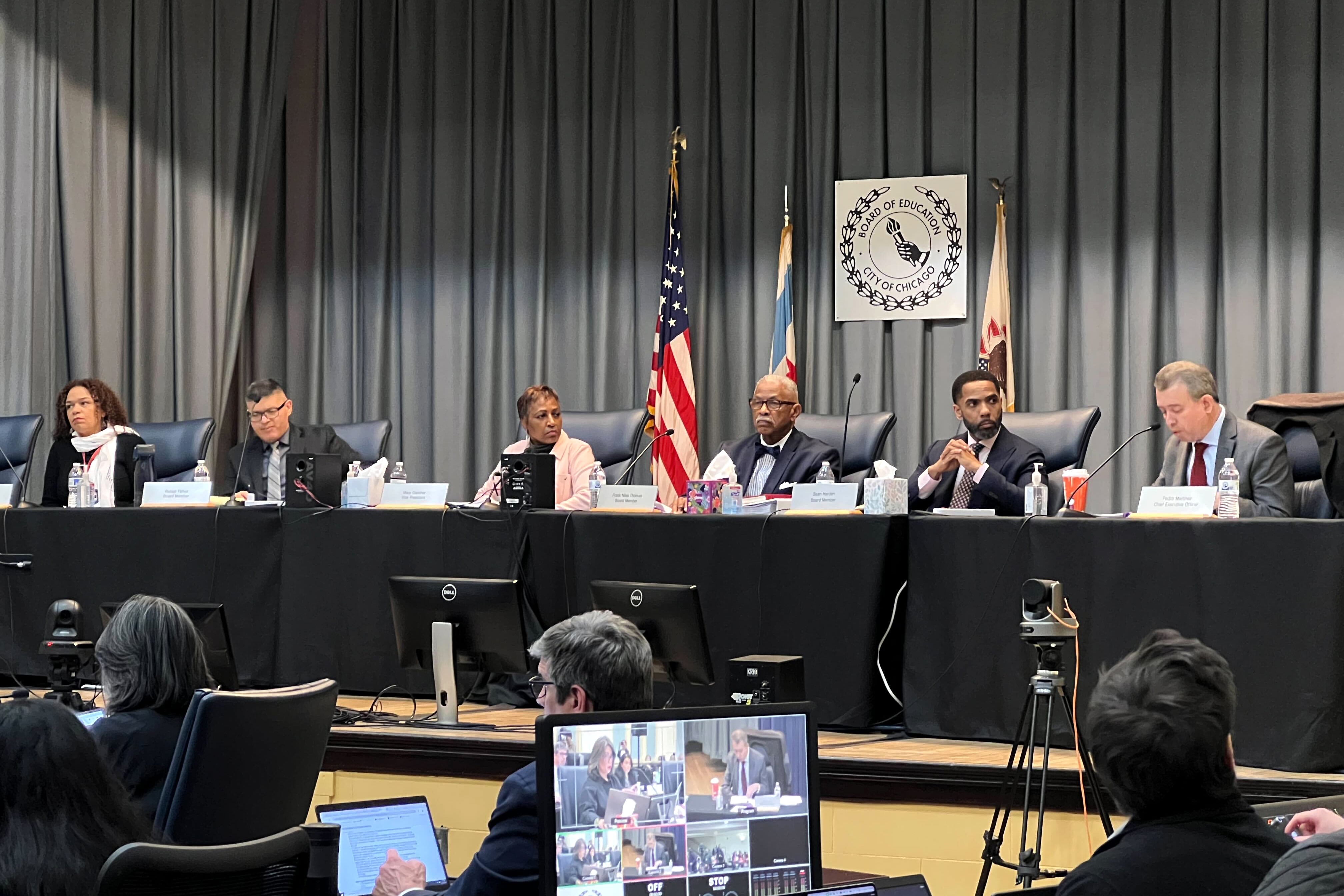Sign up for Chalkbeat Chicago’s free daily newsletter to keep up with the latest news on Chicago Public Schools.
The Chicago Teachers Union turned up the pressure Thursday for Chicago Public Schools to settle its contract before the end of 2024.
After roughly seven months of contentious talks, the union has pushed the district in recent weeks to strike a deal on its contract. The union appealed to the school board — appointed by Mayor Brandon Johnson, a former CTU employee and close ally — to press the administration on its behalf, and the board immediately obliged in a letter to CEO Pedro Martinez.
During nearly two-and-a-half hours of public comment during Thursday’s Board of Education meeting that sometimes featured boos and chants, several union members and CTU President Stacy Davis Gates called for a swift deal. The union also held a rally before the meeting to argue that although the district approved a resolution reaffirming its welcoming status to immigrants, Donald Trump’s mass deportation plans made it crucial to settle the contract and avoid disruptions to students and families.
The union’s latest push highlights the different pressures, including the new school board set to take office early next year, that are affecting contract talks.
Davis Gates asked the board to “make a directive to the senior leadership team and the CEO” to settle the contract before Trump’s inauguration.
“Settle this contract so we can have a protective force field over a district that represents the tapestry of this country,” Davis Gates said, to loud applause from dozens of union members in the audience.
The board was scheduled to discuss collective bargaining during its closed session portion at the end of its meeting, which is not open to the public.
Martinez said Thursday that daily negotiations sessions are yielding progress in several areas, thanks to a revised, shortened list of CTU priorities. For example, he said the district committed to maintain school athletic director positions and increase stipends for coaches. He also said the district will hold the line on protecting principals’ ability to lead their schools and on keeping instructional time for students unchanged.
But the union also continued to sharply criticize Martinez, whose job has hung in the balance for months after Johnson asked him in the fall to resign. Martinez has so far refused to leave or reportedly take out a buyout offer.
The union and the district appear to have made some more headway this week.
For months, CPS has resisted the union’s demands for a major increase in staffing, noting that the district added thousands of new positions during the pandemic and now faces growing budget deficits.
But union leaders announced in a video before the Thursday meeting that the district had offered to increase the number of teaching assistants, technology coordinators, and school librarians, and to create a bilingual teaching assistant pool.
The teachers’ union has also continued to push for higher pay raises after the district offered cost-of-living increases of up to 5% that would raise the average teacher salary to more than $110,000 in four years, along with other pay and benefit improvements. CTUIt has reduced its initial proposal for 9% increases to 6% the first year.
But some of the controversy about the contract isn’t really about salaries and pay increases. Some aldermen, other employee unions, incoming school board members, and others have increasingly expressed concern about rushing to settle a high-stakes contract with enormous financial and academic implications for the cash-strapped district and the city.
Some have said there shouldn’t be a deal before a new board, partly elected by the residents of Chicago, takes over in just five weeks.
“It should be that school board that begins the process of bringing back stability to our school district,” said Alderman Gilbert Villegas during a press conference this week calling for that new hybrid board to settle the contract. “They are the ones that voters picked.”
But Michilla Blaise and the rest of the board have said they have the right to make decisions they see fit immediately.
Villegas sent a letter Thursday to Illinois Attorney General Kwame Raoul to review whether the “unprecedented” standoff over the contract might violate state law, alleging that current board members have been in touch directly with the CTU about contract talks. Under state law, the schools chief is supposed to be the one negotiating directly with employee unions, with the board stepping in to approve the resulting contracts.
Separately, during Thursday’s meeting, representatives from both Service Employees International Union 73 — which represents school support staff — and the Chicago Principals and Administrators Association reiterated concerns about contract proposals that they view as scaling back the power of their own members.
And some incoming board members expressed concern about the cancellation of their board training for next week. The training was canceled at the direction of the current board, but newly elected board members say they haven’t been told why.
“The historic elected board will be joining you soon to help set district goals and priorities, approve policies, make purchasing decisions, evaluate contracts, approve the budget and capital plan, and set the school year calendar,” said board member-elect Che “Rhymefest” Smith, who will represent District 10. “We need all the information and training … with no interruptions.”
Reema Amin is a reporter covering Chicago Public Schools. Contact Reema at ramin@chalkbeat.org.
Mila Koumpilova is Chalkbeat Chicago’s senior reporter covering Chicago Public Schools. Contact Mila at mkoumpilova@chalkbeat.org.





